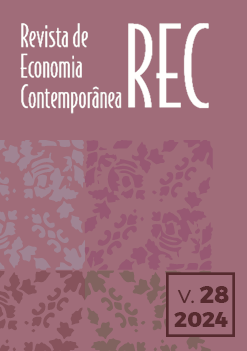Public sector economics: a critique of the assumptions of hegemonic theories
Keywords:
Public choice theory. New institutional economics. Methodological individualism. Rationality. Concrete totality.Abstract
This study aims to investigate the foundations on which are based the assumptions of normative and institutional development of the contemporary state at the heart of the hegemonic theories of the public sector economics (the Public Choice Theory and New Institutional Economics). This investigation critically problematizes that such assumptions are assigned to methodological individualism. This research finds that the methodological discussion is, in fact, a matter of ontological nature, crossing reflections that suggest the notion of “concrete totality” as a research postulate. This perception understands the real as a complex of multiple relations and diverse determinations, investigating the composition of public structures from strategic selectivities inscribed in the own institutional materiality of the state. Based on this debate, both the approach of the role of the contemporary state and of its institutional architecture consider the constitution of the public entity in a reciprocal conditioning regimen with a specific mode of social production and reproduction. Therefore, this study concludes that the strategic rationality of normative and institutional development ─ conceived by the mainstream as originating only from individual interest ─ also consists in a constitutive interdependence with the so-called “general economic interest,” which is structurally inserted in the organizational formats of the prominent arrangements.
Downloads
Published
Issue
Section
License
Copyright (c) 2024 Renato Luis Pinto Miranda, Claudio Roberto Marques Gurgel, Heirberto Cairo Carou

This work is licensed under a Creative Commons Attribution 4.0 International License.
The Revista de Economia Contemporânea (Journal of Contemporary Economics) adopted the Creative Commons license attribution-type BY-NC until April/2015. The license attribution-type BY has been adopted ever since.
Ownership of copyrights belongs to the IE-UFRJ (Instituto de Economia da UFRJ), which will not pay copyrights for published works. In accordance with current copyright regulation and the type of copyright license adopted (CC-BY), article full or partial reproduction and release are allowed provided that the citation source is disclosed. In case this copyright rule is not obliged, a written warning will be issued by the publisher to the person who has disregarded this regulation.


